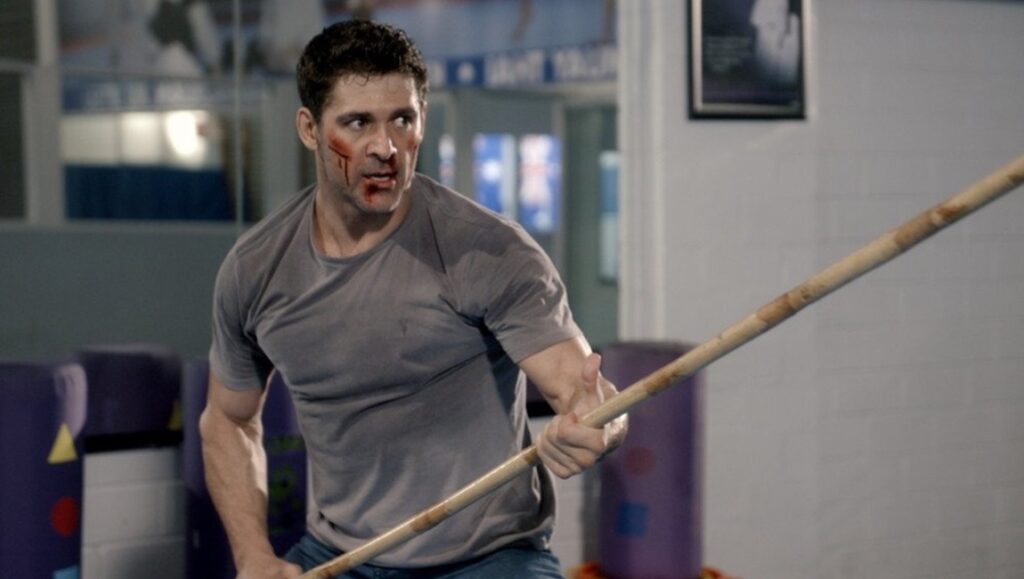It’s incredibly rare in our super-connected, social media-fueled media ecosystem for a new film to arrive with no notice, no awareness of which to speak, and definitely no fanfare. But a couple of weeks ago word started to spread on Twitter about a straight-to-VOD action film starring a (no offense intended) nobody. Not only starring, but also produced, written, directed, and choreographed all by the same guy. He’s Bren Foster, best known for a long stint on a TNT show called The Last Ship, plus some supporting roles in a few of those no-budget, usually unwatchable Steven Seagal movies that are still somehow released from time to time. Foster’s Wikipedia page notes that he has blackbelts in taekwondo, Brazilian jiujitsu, hapkido, and hwarangdo, all of which are put to good use in his deliriously action-packed Life After Fighting. It’s remarkable that this movie even exists in the first place, perhaps even more so that it’s as good as it is. Not to overhype what is, ultimately, a modestly scaled, mostly familiar DTV genre picture, but it’s possible that a better fighting movie won’t be released this year.
It’s a fine line between a vanity film and a passion project, but Foster’s effort falls squarely on the positive side of this particular divide. Like many first-time features, the film is overly plotted, as if Foster felt like he had to get every idea for a movie he had into this one, overstuffed picture. But this is a criticism that mostly falls away once the fighting begins in earnest. Here, Foster plays Alex, a retired MMA fighter who owns and operates his own martial arts studio. Much of the film’s first half follows the day-to-day activities in and around the business; Alex meets single mom Sam (Cassie Howarth) when she enrolls her son Terry (Anthony Nassif) in classes and, after some gentlemanly reluctance about dating customers, begins a tentative romance with her. Meanwhile, Sam’s ex-husband Victor (Luke Ford) and one of his flunkies start to pester Alex, while current world champ Areio Gomez (Eddie Arrazola) goes on social media and starts calling Alex a coward for refusing to fight him. These narrative threads mostly exist in the margins, Foster instead focusing on detailed footage of teaching martial arts. There’s a real emphasis on process and even the joy of pedagogy, Foster obviously delighting in a details-oriented approach to playful skirmishes and hard training. Eventually, the subplot about the reigning champ wanting to fight Alex is resolved — any other film would climax with their brawl; here, it’s an excuse for Foster to inject an action scene at the film’s mid-point. Then, Alex’s sister-in-law’s kid is kidnapped from outside the studio, leading to a desperate search for a child trafficking ring. This subplot eats up entirely too much time in an already lengthy movie, but it does help set up the final act of the film, a 40-minute, non-stop barrage of fighting as Alex lures the traffickers into his studio and proceeds to exterminate them with extreme prejudice.
Foster clearly knows his genre history, fashioning himself as a Western-style ex-gunfighter who has hung up his pistols and just wants to be left in peace. Plenty of sequences suggest the influence of classic martial arts films, where sportsmanship and mutual respect are key to a worthy opponent. And Foster himself is an ingratiating presence, a reluctant warrior who doesn’t want to kill but is pushed into it by some very, very bad men. While the kidnapping plot grinds things to a temporary halt, it at least establishes some real nasty enemies for Alex to utterly destroy. There’s no ambiguity here, just the simplicity of good vs. evil. Of course, none of this would matter if the fights were bad. They are, instead, fantastic. Foster the director really knows how to shoot and cut for Foster the choreographer. Simple framings keep the fighter’s bodies in view at all times, with clean, precise staging and minimal cutting. Everything is edited for maximum impact, saving closeups for special emphasis only, like heads and bodies crashing through glass. Foster has mentioned in interviews that he was inspired specifically by Gareth Evan’s The Raid pictures, and while he can’t match those films’ frenzied approach to extreme violence, he does wonders with an obvious low budget. Life After Fighting is clearly the end product of years of hard work; this group of fighters and stunt men have poured all their passions into this project, and the effort has paid off with an action fan’s dream movie. The next step is clear: someone needs to give Foster a blank check and let him loose.
DIRECTOR: Bren Foster; CAST: Bren Foster, Cassie Howarth, Luke Ford, Annabelle Stephenson; DISTRIBUTOR: Vertical; IN THEATERS/STREAMING: June 7; RUNTIME: 2 hr.


Comments are closed.